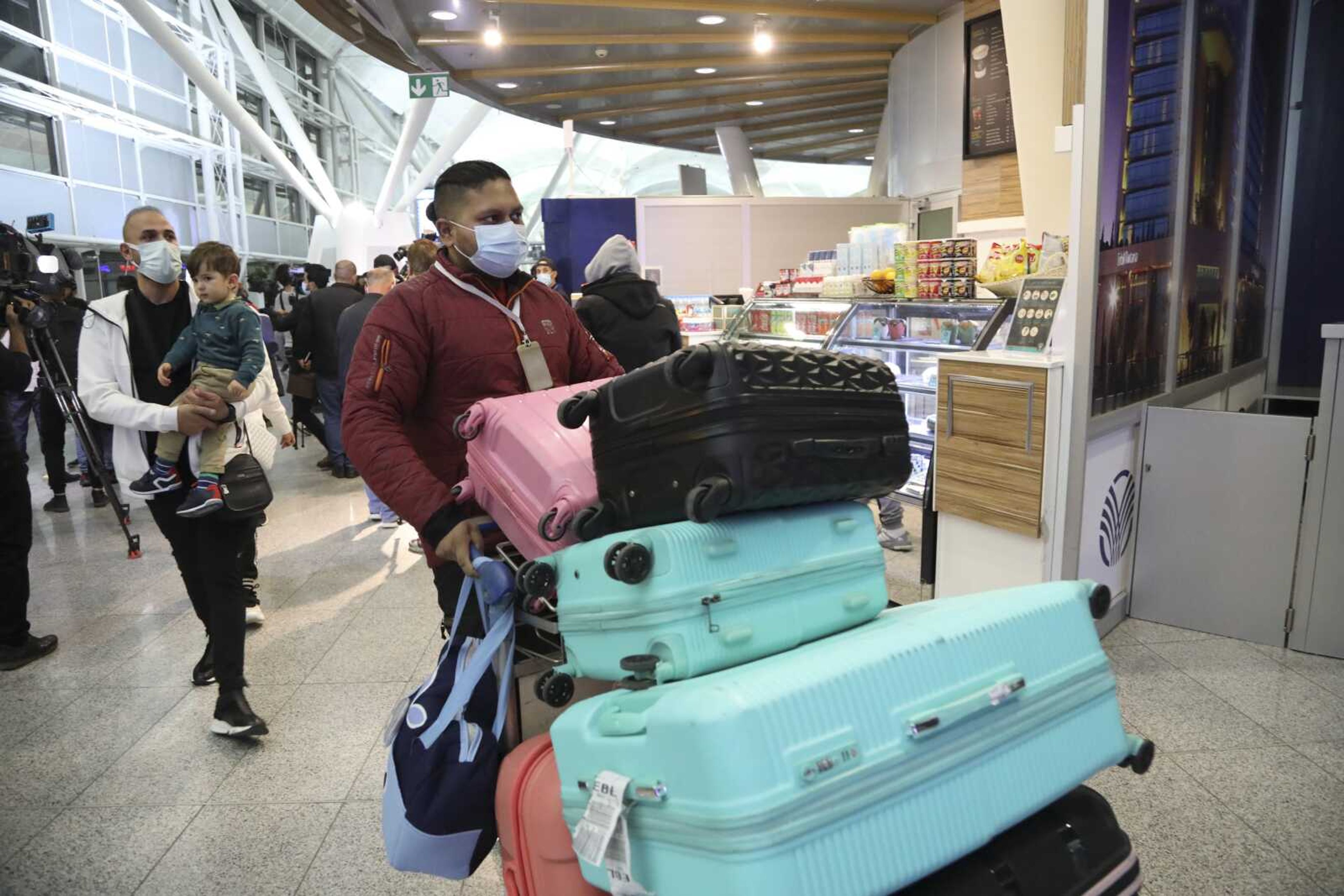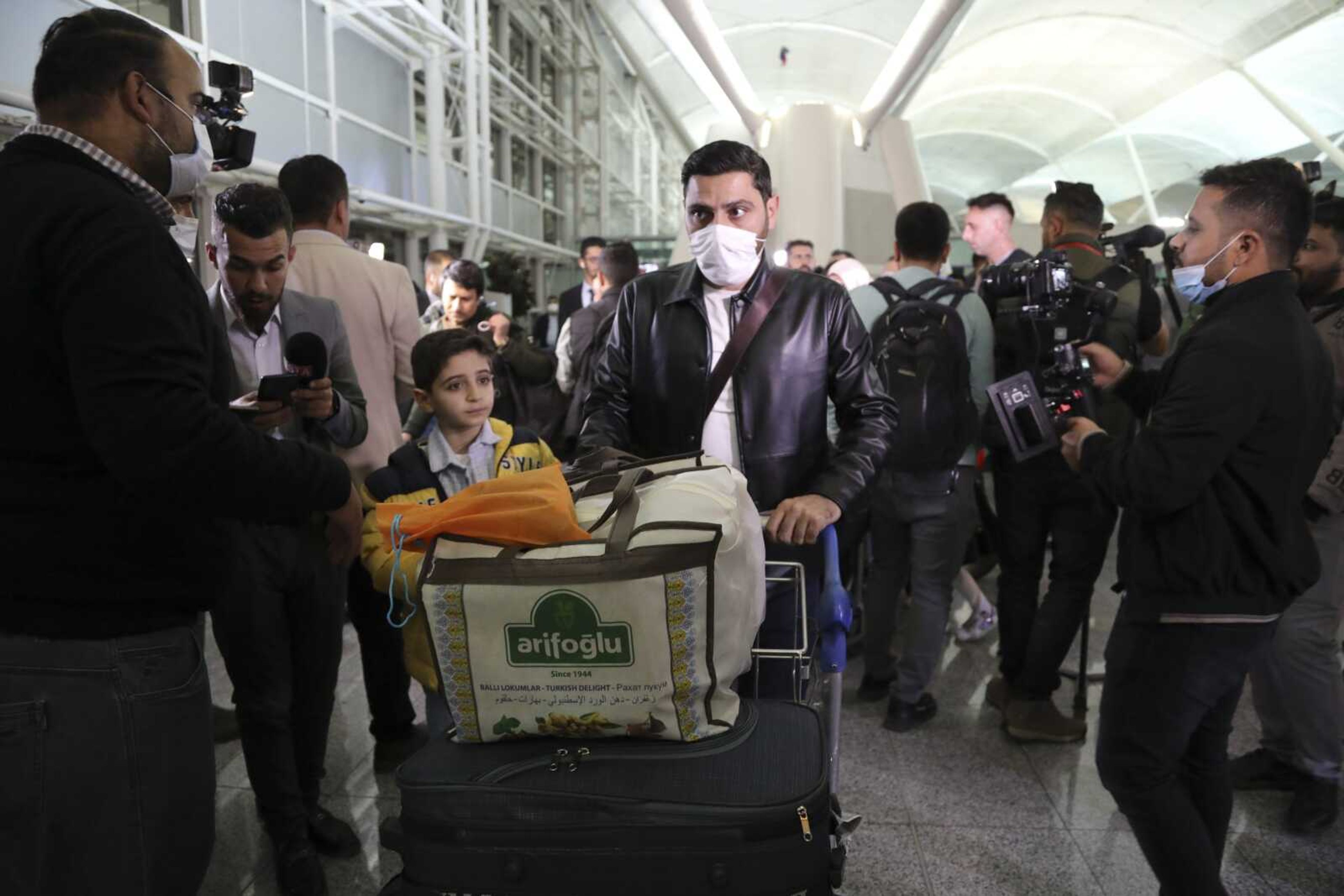Iraqi migrants caught in border crisis in Belarus fly home
BAGHDAD -- Hundreds of Iraqis returned home Thursday from Belarus after abandoning their hopes of reaching the European Union -- a repatriation coming after tensions at Poland's eastern border, where thousands of migrants became stuck in a cold and soggy forest...
BAGHDAD -- Hundreds of Iraqis returned home Thursday from Belarus after abandoning their hopes of reaching the European Union -- a repatriation coming after tensions at Poland's eastern border, where thousands of migrants became stuck in a cold and soggy forest.
Many others still in Belarus have moved into a heated warehouse not far from the border, emptying out a makeshift camp, Belarusian state-run media reported. But the Polish Defense Ministry posted video showing a few hundred people and their tents still near an official crossing point.
It was not clear whether the two countries were talking about two different sites on their border, but it was typical of the dueling narratives that have marked the crisis, in which both Belarus and Poland have sought to portray themselves in a positive light while depicting the other as unfeeling and irresponsible toward the migrants.
"We were hostages -- victims stuck between Belarus and the European Union," said a young Iraqi returnee in a black hoodie after his flight arrived in Baghdad.
"Belarus police are the same like Daesh," he said, referring to the brutal militants from the Islamic State group that rampaged through Iraq several years ago. He then walked away.

Ali Kadhim, who is returning to his home in Basra, said he wanted to go to Europe because in Iraq there are "no jobs and the situation is very bad recently."
He said he had reached a deal with a smuggler to get him to the Belarus-Poland border zone, where a Belarusian border guard took his passport and cellphone and prevented him from leaving the forest. For three days, he had no food, water or internet service, he said.
"I was living on what I found on ground. I mean, I had to live on three dates in a whole day," Kadhim said.
Of the 430 people who flew from Minsk, 390 got off at Irbil International Airport in Iraq's northern Kurdistan region before the flight continued to Baghdad, said Jihad al-Diwan, head of media relations for Iraq's civil aviation authority. About 30 others who were registered for the flight had problems with their documents and did not board, according to Iraqi officials, who organized the return.
One woman arriving in Irbil carried a bassinet with a baby. Most still wore the heavy winter clothes from their time in Belarus despite the warm weather in Iraq. Another woman collapsed, apparently fainting.
Tensions had flared at the Poland-Belarus border in recent days, with about 2,000 people trapped between the forces from the two countries. On Tuesday, some of the migrants had thrown stones at the Polish troops, who responded with tear gas and water cannons.
The U.N. refugee agency says about half the migrants at the border area were women and children.
At least 12 people have died in the area in recent weeks from the harsh conditions in the border zone, including a 1-year-old whose death was reported Thursday by a Polish humanitarian organization.
Muslims in Poland buried an unidentified migrant at a cemetery in Bohoniki, where a population of Tatars has lived for centuries. It was the second such funeral there for a migrant in a week.
Most of the migrants are fleeing conflict or hopelessness in the Middle East and aim to reach Germany or other western European countries. But Poland has taken a hard line about letting them n, and Belarus didn't want them returning to the capital of Minsk or otherwise settling in the country.
The West has accused Belarus President Alexander Lukashenko of using the migrants as pawns to destabilize the 27-nation bloc in retaliation for its sanctions on his authoritarian regime. Belarus denies engineering the crisis, which has seen migrants entering the country since summer and then trying to cross into Poland, Lithuania and Latvia.
Perhaps as many as 7,000 migrants remain in Belarus, according to authorities there. Many have moved to the temporary shelter of the warehouse since Tuesday, where they were given mattresses, water, hot meals and medical assistance.
Iraqi Kurds said the warehouse had filled quickly, with not enough food or places to sleep. A video obtained by The Associated Press showed men, women and children in sleeping bags or on blankets on the floor.
"At first, the situation was good, I mean on the first day. We were receiving three meals a day. But as more people came in from the forest, it has got more and more crowded. As a result, we got no dinner yesterday and no lunch today," one young Iraqi Kurdish man said.
"As you can see, it is getting very crowded here, and it is not easy to find a place to sit or to sleep," he added, speaking on condition of anonymity because he feared reprisals. "But it is much better than staying in the forest."
Everyone in the warehouse "has spent a lot of money to come here and they don't want to go back," he said.
Amid the border tensions, the war of words has drawn in the EU and Belarus ally Russia as well.
EU Union Commissioner for Home Affairs Ylva Johansson accused Belarus of engaging in "an act of state-sponsored migrant smuggling" and said sanctions and stopping flights to Minsk carrying migrants were "our most effective tools in this struggle."
Foreign ministers of the G-7 group of leading industrialized countries also condemned "the Belarus regime's orchestration of irregular migration across its borders."
Natalya Eismont, a spokeswoman for Lukashenko, said the fact that hundreds left Belarus shows the government is keeping its part of the bargain. The rest are "categorically refusing to fly, but we will work on it," she said.
Lukashenko had proposed to German Chancellor Angela Merkel that the EU could open a "humanitarian corridor" to allow 2,000 migrants to head to Germany, while Belarusian authorities try to get the other 5,000 to return home, Eismont said.
But German Interior Minister Horst Seehofer said in Warsaw that suggestions Germany would be ready to receive 2,000 migrants is "false information."
Following a call Tuesday between Merkel and Lukashenko, her office stressed the need for humanitarian assistance and for the migrants' safe return home.
Poland's tough stand against their illegal entry included reinforcing the border with riot police and troops and plans to build a steel barrier. That approach has largely been met with approval from other EU nations, who want to stop a surge of migration.
But Poland also has been criticized by human rights groups and others for pushing migrants back into Belarus and not allowing them to apply for asylum.
Tuesday's border skirmishes injured 12 of the border forces. Warsaw accused Belarus of instigating the conflict, while the government in Minsk denounced Poland's "violent actions."
Lukashenko has rejected accusations of engineering the crisis and said his government has deported about 5,000 illegal migrants from Belarus this fall.
In May, however, he had railed against EU sanctions imposed for his harsh crackdown on internal dissent and said it would no longer stop migrants, telling the bloc: "Now you will catch them and eat them yourself."
On Thursday, Lukashenko's ally Russian President Vladimir Putin also slammed the EU.
"Western countries are using the migration crisis on the Belarusian-Polish border as a new reason for tension in the region that is close to us, for pressure on Minsk, and at the same time they forget their own obligations in the humanitarian sphere," he said.
Litvinova reported from Moscow and Karmanau reported from Kyiv, Ukraine. Associated Press journalists Vanessa Gera in Warsaw, Sabina Niksic in Sarajevo, Bosnia and Herzegovina, Frank Jordans in Berlin, Samuel Petrequin in Brussels, Rashid Yahya in Irbil, Iraq, and Jim Heintz in Moscow contributed.
Connect with the Southeast Missourian Newsroom:
For corrections to this story or other insights for the editor, click here. To submit a letter to the editor, click here. To learn about the Southeast Missourian’s AI Policy, click here.









